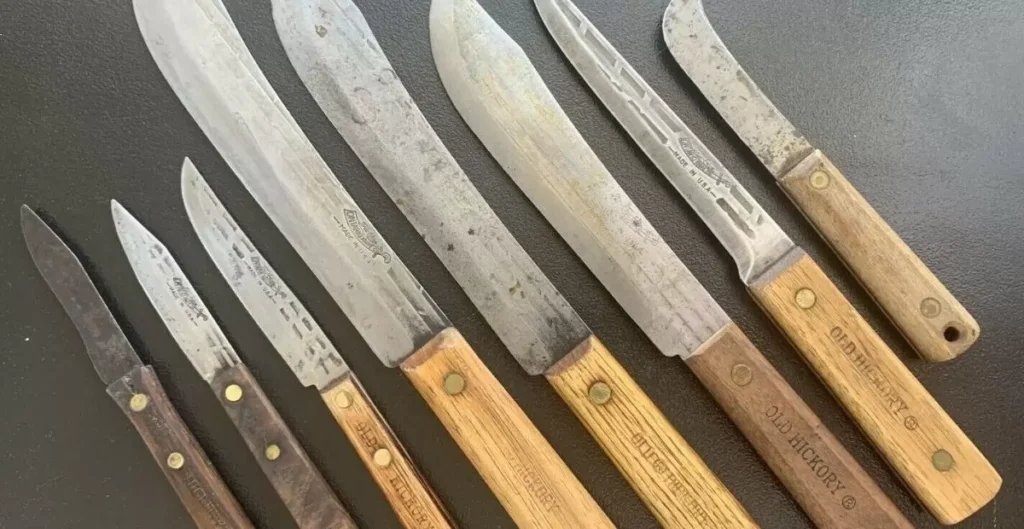Stainless steel knives rust when they undergo a process of corrosion, resulting in the formation of reddish-brown iron oxide on their surfaces. Corrosion occurs when the protective layer on the stainless steel is compromised, allowing oxygen and moisture to interact with the iron content in the knives.
The perplexing question echoes in the minds of many. Who have experienced the frustration of finding rust on their once-pristine kitchen tools. Why do my stainless steel knives rust in the dishwasher? The dishwasher, known for its convenience in cleaning, becomes a source of bewilderment of rust formation on their stainless steel knives.
The unique challenge of stainless steel knives rusting in the dishwasher stems from the harsh conditions they face during the cleaning process. The combination of high water pressure, aggressive detergents, and prolonged exposure to moisture creates an environment that can compromise the stainless steel’s protective layer.
Defining The Process Of Rust Formation On Stainless Steel Knives
Stainless steel knives, although resistant to corrosion, are not entirely impervious to the challenges posed by rust. Rusting in the dishwasher is a result of the corrosion process, wherein the protective chromium oxide layer on the stainless steel surface becomes compromised.
When exposed to a combination of water, detergents, and heat in the dishwasher, this protective layer may break down, allowing oxygen and moisture to interact with the iron content in the knives. This breakdown in the stainless steel’s defense mechanism is the fundamental process behind the perplexing issue of knives rusting in the dishwasher.
Impacts on Stainless Steel knives Rust In The Dishwasher
The presence of rust on stainless steel knives can have multifaceted consequences that extend beyond mere aesthetics. Rust compromises the structural integrity of the knives, leading to potential performance issues. The sharpness and overall effectiveness of the blades may diminish over time, impacting their cutting precision.
Rusted knives pose health concerns as the iron oxide can transfer onto food, making it unsafe for consumption. Beyond functionality, the rusted appearance tarnishes the overall quality of the kitchen tools. These impacts underscores the importance of addressing the root causes of rust formation in the dishwasher to preserve both the utility and visual appeal of stainless steel knives.
Why Protective Layer Matters Against Knives Rust in the Dishwasher
The protective layer on stainless steel knives plays a crucial role in preventing rust, acting as a shield against the corrosive elements present in the dishwasher. This layer, typically made of chromium oxide, forms a thin, invisible barrier. It inhibits the interaction of oxygen and moisture with the iron in the steel.
When this protective layer is intact, it ensures the longevity and rust-resistant properties of the knives. The harsh conditions within the dishwasher, including high water pressure and potent detergents, can compromise this protective layer. Once breached, the knives become susceptible to rust formation, as the exposed iron reacts with the surrounding elements.
How The Dishwasher’s Conditions Contribute To The Rusting Of Stainless Steel Knives
The dishwasher, designed for the convenience of cleaning, inadvertently becomes a challenging environment for stainless steel knives. The combination of high water pressure, strong detergents, and prolonged exposure to moisture creates a perfect storm for rust formation.
The aggressive nature of dishwasher cleaning can strip away the protective layer on the knives, making them more prone to corrosion. The enclosed and humid environment inside the dishwasher allows for the persistence of moisture on the knives, accelerating the rusting process. These contributing factors sheds light on why stainless steel knives rust in the dishwasher.
Why Do My Stainless Steel Knives Rust In The Dishwasher

Understanding why stainless steel knives rust in the dishwasher involves unraveling the intricate chemical reactions that contribute to the corrosion process. Stainless steel is composed of iron, chromium, nickel, and other elements. The chromium content, in particular, forms a thin, invisible oxide layer on the surface, providing corrosion resistance.
When this protective layer is compromised, typically through scratches or exposure to harsh conditions, the iron in the stainless steel reacts with oxygen and moisture. This reaction results in the formation of iron oxide, commonly known as rust, which manifests as reddish-brown stains on the surface of the knives.
Chemical Reactions Involved In The Corrosion Process Leading To Rust
The dishwasher’s environment plays a crucial role in accelerating these chemical reactions. The combination of high water pressure, aggressive detergents, and prolonged exposure to moisture heightens the vulnerability of the protective layer. As the knives go through the cleaning cycle, the aggressive conditions in the dishwasher strip away the protective chromium oxide layer.
When applied to cars made of stainless steel, exposure to oxygen and water can trigger corrosive effects. Understanding this chemistry reveals why protective measures are vital for maintaining the longevity of stainless steel automotive components.
Tips and Preventive Measures To Safeguard Knives From Rust While Using The Dishwasher
To shield your stainless steel knives from rust in the dishwasher, adopting some simple yet effective preventive measures is key.
- Firstly, always hand wash knives when possible, using a mild detergent and warm water. This practice not only minimizes exposure to the abrasive dishwasher environment but also allows for more controlled cleaning.
- If dishwasher use is unavoidable, ensure that the knives are placed in a way that avoids direct contact with other utensils.
- Utilizing a dishwasher-safe knife block or rack can be a wise investment, providing a secure and separated space for each knife during the cleaning cycle.
- Consider using a rinse aid in the dishwasher to reduce water spots and enhance the drying process, minimizing the chances of lingering moisture causing rust.
Solutions And Methods To Restore Knives Affected By Rust
Discovering rust on your stainless steel knives is disheartening, but fret not. There are effective solutions to restore them to their former glory. Begin by gently scrubbing the rusted areas with a non-abrasive scrubber or a mixture of baking soda and water. This helps to remove the surface rust without compromising the blade.
For more stubborn rust, a specialized rust remover can be employed. It ensures to follow the product instructions carefully. After rust removal, thorough drying becomes crucial. Hand-dry the knives immediately after washing. If possible, apply a light coating of mineral oil or food-grade mineral oil to create an additional protective barrier against future rusting.
Table: Best Practices for Dishwasher Care of Stainless Steel Knives
| Practice | Description |
| Hand Wash When Possible | Opt for hand washing using mild detergent and warm water to minimize exposure to harsh dishwasher conditions. |
| Use a Dishwasher-Safe Knife Block | Invest in a dishwasher-safe knife block or rack to ensure proper separation and protection for each knife during cleaning. |
| Utilize a Rinse Aid | Incorporate a rinse aid in the dishwasher to reduce water spots and enhance the drying process, minimizing lingering moisture. |
| Gently Scrub Surface Rust | Use a non-abrasive scrubber or a baking soda-water mixture to gently scrub surface rust off the knives without compromising the blade. |
| Apply a Light Coating of Oil | After thorough drying, apply a light coating of mineral oil or food-grade mineral oil to create an additional protective barrier against future rust. |
FAQs
Why are my stainless steel knives rusting in the dishwasher?
Stainless steel knives may rust in the dishwasher due to the harsh dishwasher environment compromising their protective layers, making them susceptible to corrosion.
Can I prevent rust in the dishwasher on my stainless steel knives?
Yes, adopting preventive measures such as handwashing knives, using milder detergents, and ensuring proper drying can help protect stainless steel knives from rust in the dishwasher.
How can I restore stainless steel knives affected by rust in the dishwasher?
To address rust issues, try using a mixture of baking soda and water to gently scrub the affected areas, followed by thorough drying and oiling to restore and protect the knives.
Conclusion
In the world of stainless steel knives and dishwashers, keeping rust at bay becomes a shared mission. The science behind corrosion and the impact of dishwasher conditions is the first step towards conquering this challenge. By recognizing the vulnerability of the protective layer on our trusty knives and adopting mindful dishwasher habits.
We pave the way for a rust-free culinary journey. Prevention, it seems, is the key to maintaining the gleam and sharpness of our stainless steel companions. For those unfortunate moments when rust appears, quick and effective remedies can rescue our knives from the clutches of corrosion.

